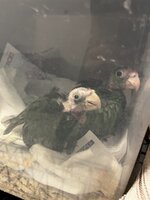Lukewarm45
Moving in
- Joined
- 7/21/23
- Messages
- 5
Hello! I recently got these two siblings from a breeder last week. When I got them, I was told they were about 5-6 weeks old. So I'm guessing they're about 6-7 weeks by now. Unfortunately the seller was not able to wean them fully before I could pick them up, so she gave me some instructions on how to care for them and here I am! I just want to make sure that I'm doing the best I can for them and I'm seeking some advice or help to do so.
Right now, I'm feeding them at least 3 times a day with about 3-4 ml of formula per feeding (as instructed). But, as they're growing older, I figured it would be better to increase the amount they eat. My question is how much should I feed them? I recently read about the 10-12% rule to determine how much to feed depending on their body weight. Would this be 10-12% per feeding or throughout the day?
I also just weighed them, and they weigh about 105g and 150g respectively. The large difference in weight made me feel a bit funny, so I also was wondering if this is normal? If some birds just weigh less? She does look physically smaller in general, but I wasn't sure if that's because of her genes or if the ages I was told were funky. My concerns especially arose because she doesn't seem to have as much feathers on her head (though they are slowly coming in on her chest)
Lastly, I was planning on introducing a little bit of soft foods into their diet at around 8 weeks (as instructed via breeder). Is this alright to do for them? I saw some sources where they mentioned weaning at around 12 weeks and wasn't sure (though I do understand the process can vary a little bit).
Right now they're very active during feeding and pretty much sleep and walk around a bit. I'd appreciate any help I could get! Thank you! (The balder one is the smaller/lighter one!)
Right now, I'm feeding them at least 3 times a day with about 3-4 ml of formula per feeding (as instructed). But, as they're growing older, I figured it would be better to increase the amount they eat. My question is how much should I feed them? I recently read about the 10-12% rule to determine how much to feed depending on their body weight. Would this be 10-12% per feeding or throughout the day?
I also just weighed them, and they weigh about 105g and 150g respectively. The large difference in weight made me feel a bit funny, so I also was wondering if this is normal? If some birds just weigh less? She does look physically smaller in general, but I wasn't sure if that's because of her genes or if the ages I was told were funky. My concerns especially arose because she doesn't seem to have as much feathers on her head (though they are slowly coming in on her chest)
Lastly, I was planning on introducing a little bit of soft foods into their diet at around 8 weeks (as instructed via breeder). Is this alright to do for them? I saw some sources where they mentioned weaning at around 12 weeks and wasn't sure (though I do understand the process can vary a little bit).
Right now they're very active during feeding and pretty much sleep and walk around a bit. I'd appreciate any help I could get! Thank you! (The balder one is the smaller/lighter one!)
Attachments
-
83.8 KB Views: 22
-
90.8 KB Views: 22




 To the site ..best of luck with your babies
To the site ..best of luck with your babies 
